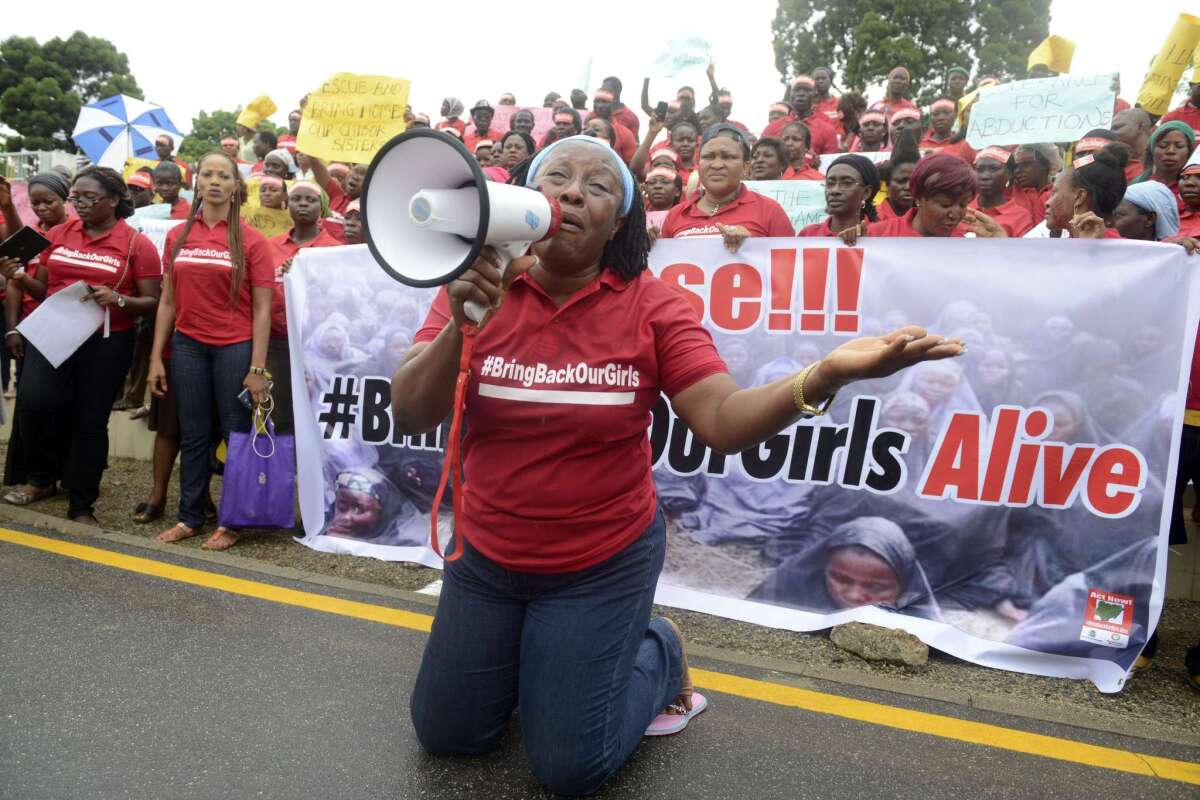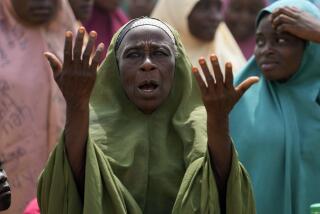Op-Ed: Abducted Nigerian girls still missing, a distracted world must remember

Eight months is a long time. Long enough for international outrage to rise, fall and fade away. That’s how long it’s been since Boko Haram militants stormed a secondary school in the northeastern village of Chibok in Nigeria, abducting more than 200 still-missing teenage girls.
A global Twitter campaign — #BringBackOurGirls — caught fire with the help of First Lady Michelle Obama, former Secretary of State Hillary Rodham Clinton, British Prime Minister David Cameron and, most important, millions of global hashtag activists.
But since then we have felt tremors as Russia annexed Crimea, as Islamic State gained ground and as Ebola did its deadly work in West Africa. All of this turned the attention of world leaders, citizens and the media away from the 219 abducted Nigerian girls.
Meanwhile, international efforts to recover the girls failed, including several rounds of negotiations to exchange the girls for Boko Haram fighters held in Nigerian jails.
Boko Haram only upped the ante in pursuit of its goal of establishing a fundamentalist Islamic state in northeastern Nigeria and eliminating Western influence in its schools. The militants, declared a terrorist group by the U.S. in 2013, continued to attack Nigerian villagers, killing some and abducting others. The New York Times reported a month ago that Boko Haram “was able to strike at will” in northeastern Nigeria.
I know from experience how difficult it is to stop such aggression. In 1985, at age 16, I was abducted into war by rebels from remnants of the Uganda National Liberation Army. I eventually escaped and reclaimed my life. Years later, my younger brother Godfrey was not so lucky. He too was kidnapped, this time by Joseph Kony’s Lord’s Resistance Army, and he was killed in battle.
I lost my brother, but I do not lose hope that these tragedies can be stopped. And yet, I fear that hope for the Nigerian girls is slipping away, internationally. Tickers marking the days since their abduction have disappeared from newspapers, Web pages and broadcasts. Does anyone still remember the 219 missing girls?
They do in Abuja, Nigeria’s capital. Every day the Bring Back Our Girls demonstrators — whose activism fueled the hashtag campaign — rally at Unity Fountain in Abuja. Families of the missing girls, their neighbors and fellow citizens, about 100 strong, congregate, carrying signs and chanting the now-familiar mantra: “Bring back our girls.”
They are indefatigable. They’ve withstood government repression, refusing to stop when Abuja police ordered an end to the rallies. In the local media, they’ve dismissed conspiracy theorists who, bizarrely, postulated the girls were never abducted. They outlasted “counter-activists” trying to shout down their demands with campaign rallies for Nigerian President Goodluck Jonathan, the very man the protesters think hasn’t done enough to rescue the girls.
But can Bring Back Our Girls overcome time and the cynicism it breeds? After some 4 million tweets, the 219 girls have not been rescued. So what’s the point, right?
Wrong. Remember, until a social-media savvy Nigerian lawyer, Ibrahim Abdullahi, came up with #BringBackOurGirls, there had been little coverage of the abductions. When Abdullahi heard former World Bank Vice President Obiageli Ezekwesili say “Bring back our girls” in a speech, he echoed the phrase on Twitter, and the demonstrators amplified it at Unity Fountain and online. Finally their cry was heard.
Had it not been for that social media campaign would anyone outside Nigeria know about the Chibok girls? Would the story have lasted more than one news cycle in the West? Would you be reading this now?
It’s time to remind a distracted world that Boko Haram must be defeated. Social media won’t return the girls, but the world’s attention can help. It’s time to stand again with the demonstrators at Unity Fountain. Make this your 2015 resolution: I will #RememberOurGirls.
And, in case you’re wondering, it’s been 269 days since they were abducted.
Okello Kelo Sam is a musician and actor and the founder of Hope North, a secondary school in Uganda for the victims of that country’s civil war. He appeared in “The Last King of Scotland.”
Follow the Opinion section on Twitter @latimesopinion
More to Read
A cure for the common opinion
Get thought-provoking perspectives with our weekly newsletter.
You may occasionally receive promotional content from the Los Angeles Times.










